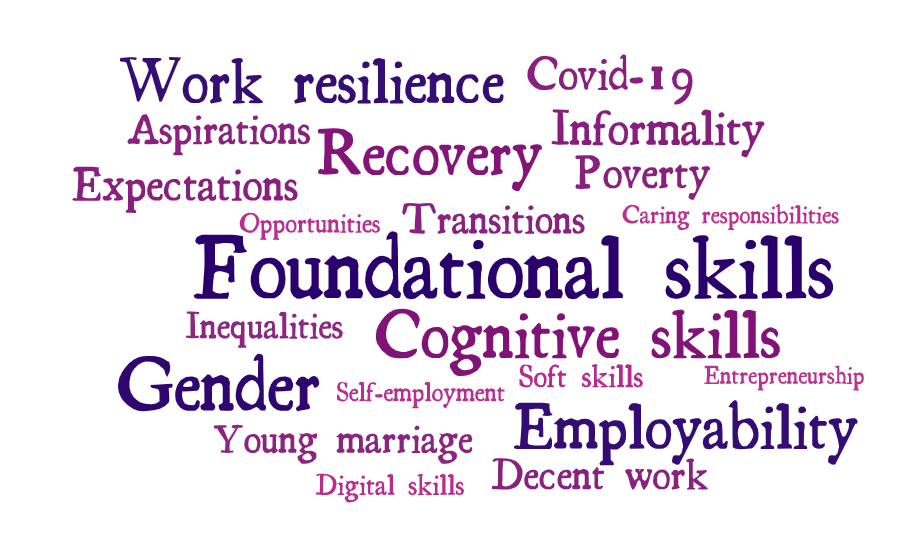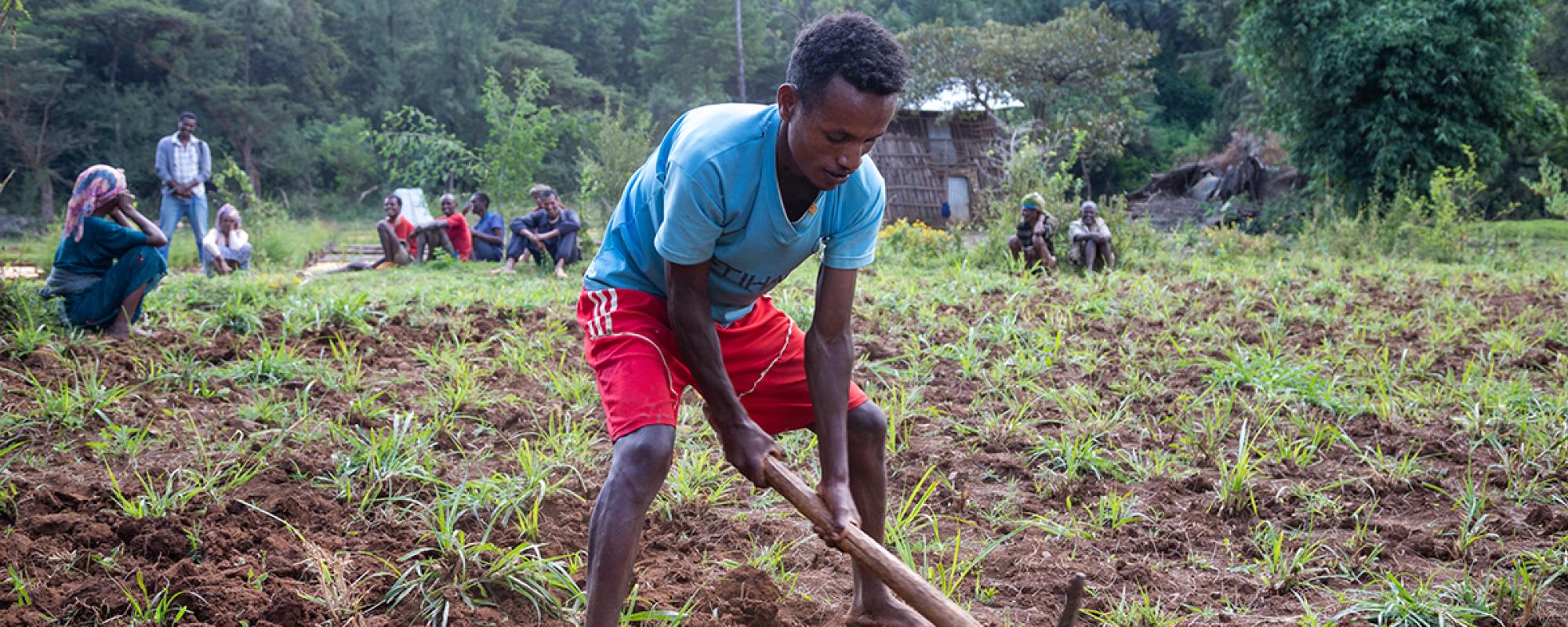
Equal access to secure, decent jobs is critical to improving the lives of young people from disadvantaged backgrounds and enabling inclusive and sustainable economic growth, as set out in Sustainable Development Goal 8.
With an increasing number of Young Lives participants now part of the labour force, our longitudinal data allows us to see how early childhood poverty and widening inequalities impact their transition from school to work, across very different country contexts.
Labour markets in Young Lives country sites are diverse and complex, typically with high levels of informality and self-employment, and limited access to social security. Many of the young people in our study began their working lives during childhood, often unpaid and supporting the family farm or business. As they reach adulthood, aspirations to improve their situation in life and demand for decent work, through access to good quality, better paid and secure jobs, are much higher than for previous generations.
Over the past 20 years, Young Lives has investigated pathways into decent work and entrepreneurship, exploring different routes from school into higher education and the labour market. Even though the demand for decent work is higher than previous generations, young people from poor households and rural areas remain less likely to secure decent work compared to those from wealthier and urban households.
Inequalities in skills and learning appear very early in life and can be linked to differences in employment in young adulthood. Socio-emotional skills, as well as cognitive skills, matter to access good quality jobs. Gender is also an important factor, with young men typically moving into employment at a younger age than young women across all our study countries and there are also significant gender gaps in both employment and income.
Staying in education longer does not necessarily translate into better labour market opportunities for young women, and marriage at a younger age remains a key barrier to women joining the labour force. As well as marriage, young people's unpaid domestic work also hinders gender equality in employment; although unpaid household work in adolescence does lead to a greater chance of being employed in early adulthood, those jobs are of a lower quality across all four Young Lives' countries.
Having a job does not necessarily translate into increased well-being compared to being out of employment or in education. Instead, it is job quality, pay, conditions and young people's pride in their work that are much more important for individuals' well-being.

The young people in our study have started adult life amidst the profound economic and social impacts of the global Covid-19 pandemic, an escalating climate crisis, and, in Ethiopia, an on-going conflict.
The COVID-19 pandemic and associated lockdowns resulted in widespread job losses and shifting job patterns around the world. Evidence from our 2020 phone survey shows that initial income losses predominantly impacted young people from poor and rural backgrounds, widening inequalities and putting vulnerable households under significant economic and social stress.
Unequal recovery in employment rates since the pandemic has increased the gender employment gap, with significantly slower job recovery among young women linked to the increased burden of unpaid caring responsibilities. The pandemic also led to a shift from more formal work towards self-employment and agricultural work, suggesting a deterioration in job quality in some areas. In Ethiopia and India, agricultural activity remains higher than before the pandemic; self-employment remains higher than before the pandemic in Peru and Vietnam.
Global shifts in the labour market are changing the nature for work for many young people in our study, creating new opportunities for those with relevant skills, but also increasing the challenges for those who lack them. This presents opportunities for future research building on Young Lives' understanding of young people's pathways from education into decent work and entrepreneurship, and analysis of the unprecedented employment challenges young people faced post Covid-19. Areas for future research, drawing on Young Lives longitudinal data include:
- The relationship between early life poverty and age of entry into the workforce, including the type of work undertaken;
- The link between early life job aspirations and the reality of work in later life;
- The association between quality of education and later earnings including job quality;
- The relationship between job quality, mental health and overall life satisfaction;
- Gender differences in domestic work versus paid work in the pre and post pandemic contexts.
Equal access to secure, decent jobs is critical to improving the lives of young people from disadvantaged backgrounds and enabling inclusive and sustainable economic growth, as set out in Sustainable Development Goal 8.
With an increasing number of Young Lives participants now part of the labour force, our longitudinal data allows us to see how early childhood poverty and widening inequalities impact their transition from school to work, across very different country contexts.
Labour markets in Young Lives country sites are diverse and complex, typically with high levels of informality and self-employment, and limited access to social security. Many of the young people in our study began their working lives during childhood, often unpaid and supporting the family farm or business. As they reach adulthood, aspirations to improve their situation in life and demand for decent work, through access to good quality, better paid and secure jobs, are much higher than for previous generations.
Over the past 20 years, Young Lives has investigated pathways into decent work and entrepreneurship, exploring different routes from school into higher education and the labour market. Even though the demand for decent work is higher than previous generations, young people from poor households and rural areas remain less likely to secure decent work compared to those from wealthier and urban households.
Inequalities in skills and learning appear very early in life and can be linked to differences in employment in young adulthood. Socio-emotional skills, as well as cognitive skills, matter to access good quality jobs. Gender is also an important factor, with young men typically moving into employment at a younger age than young women across all our study countries and there are also significant gender gaps in both employment and income.
Staying in education longer does not necessarily translate into better labour market opportunities for young women, and marriage at a younger age remains a key barrier to women joining the labour force. As well as marriage, young people's unpaid domestic work also hinders gender equality in employment; although unpaid household work in adolescence does lead to a greater chance of being employed in early adulthood, those jobs are of a lower quality across all four Young Lives' countries.
Having a job does not necessarily translate into increased well-being compared to being out of employment or in education. Instead, it is job quality, pay, conditions and young people's pride in their work that are much more important for individuals' well-being.

The young people in our study have started adult life amidst the profound economic and social impacts of the global Covid-19 pandemic, an escalating climate crisis, and, in Ethiopia, an on-going conflict.
The COVID-19 pandemic and associated lockdowns resulted in widespread job losses and shifting job patterns around the world. Evidence from our 2020 phone survey shows that initial income losses predominantly impacted young people from poor and rural backgrounds, widening inequalities and putting vulnerable households under significant economic and social stress.
Unequal recovery in employment rates since the pandemic has increased the gender employment gap, with significantly slower job recovery among young women linked to the increased burden of unpaid caring responsibilities. The pandemic also led to a shift from more formal work towards self-employment and agricultural work, suggesting a deterioration in job quality in some areas. In Ethiopia and India, agricultural activity remains higher than before the pandemic; self-employment remains higher than before the pandemic in Peru and Vietnam.
Global shifts in the labour market are changing the nature for work for many young people in our study, creating new opportunities for those with relevant skills, but also increasing the challenges for those who lack them. This presents opportunities for future research building on Young Lives' understanding of young people's pathways from education into decent work and entrepreneurship, and analysis of the unprecedented employment challenges young people faced post Covid-19. Areas for future research, drawing on Young Lives longitudinal data include:
- The relationship between early life poverty and age of entry into the workforce, including the type of work undertaken;
- The link between early life job aspirations and the reality of work in later life;
- The association between quality of education and later earnings including job quality;
- The relationship between job quality, mental health and overall life satisfaction;
- Gender differences in domestic work versus paid work in the pre and post pandemic contexts.




